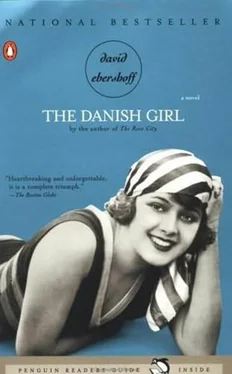With Edvard IV in his lap, Einar thought about this. His shirt was wrinkled, and next to him on the table was a plate of pears. “Do you think I can?” he said.
She led him into her studio, showed him the half-finished portrait. “I think there should be a kettle-hole lake on the horizon,” she said.
Einar stared at the half-finished painting. He looked at it blankly, as if he didn’t recognize the girl. Then, slowly, an understanding filled his eyes, the lids pulling back, his brow smoothing out. “A few things are missing,” he said. “Yes, there should be a lake, and also a single willow growing from the bank of a stream. And perhaps a farmhouse. Too far off in the horizon to be sure what it is, just a pale brown blur of something. But there ’d probably be a farmhouse.”
He stayed up most of the night with the painting, smudging his shirt and his pants. Greta was happy to see him at work again, and she began to think of other paintings she could share with Einar. Even if it meant fewer afternoons with Lili, she wanted Einar to have his work. As she prepared for bed she heard him in her studio, the clink of the glass paint bottles. She couldn’t wait to call Hans in the morning to tell him that Einar was painting again. That she ’d found a way to produce even more Lili paintings. “You’ll never believe who’s helping me out,” she’d say. The memory of Hans at the Gare du Nord over three years ago revisited her. It was when she and Einar first arrived in Paris, with only a handful of addresses in their notebooks. Hans was waiting at the train station, his camel hair coat a still beige column in the crowd of black wool. “You’ll be fine,” he assured Greta, kissing her cheek. He clasped both his hands around Einar’s neck, kissing his forehead. Hans chauffeured them to a hotel on the left bank a few blocks from the Ecole des Beaux-Arts. Then he kissed them goodbye. Greta remembered feeling crushed, that Hans would meet them with open arms and then disappear so quickly. She watched his Borreby head slip through the lobby door. Einar must have felt the same disappointment, or worse. “Do you suppose Hans didn’t want us to come?” he said. Greta was wondering that herself, but she reminded Einar how busy Hans was. In truth, she had sensed a grave reluctance from Hans, in his stance as straight and steely as one of the columns supporting the station’s roof.
Einar said, “Do you suppose we’re too Danish for his taste? Too provincial?” And Greta, who looked at her husband with his bog-brown eyes and his shaking fingers and Edvard IV in his arms, replied, “It’s him, not us.”
At the hotel they let two rooms, trimmed in red, one with a curtained alcove. The hotel’s factotum declared proudly that Oscar Wilde had lived his final weeks there. “He passed on in the alcove,” the proprietress reported with a dip of her chin.
Greta took little note of this bit of history. It seemed too depressing a fact for her to press onto Einar. They lived in the two rooms for several months while they hunted for an apartment. After only a few days the hotel became dreary, with its curling wallpaper and rust stain bleeding in the sink. But Einar insisted that he pay for their lodging, which ruled out the nicer apartments available at the Hôtel du Rhin or the Edouard VII. “There’s really no need to suffer,” Greta had said, proposing more luxurious surroundings, and perhaps a view and decent maid service for evening coffee. “Are you really suffering?” Einar replied, causing Greta to drop the subject. She sensed the unease between them that happened when they traveled.
There was a little stove in the corner on which she would boil water for their coffee. They took to sleeping in the alcove, in the bed that sagged in the middle and placed them close to the wall that permitted every squeal from the next room to pass through. Einar set up his easel in the room with the alcove; Greta took the second room, feeling a sense of relief when its door latch caught and she was alone. The trouble was, she couldn’t paint alone. She needed Lili.
They had been in Paris only a month when Greta said, “I want to celebrate our arrival with Lili.” Greta could see the terror in her husband ’s eyes, the way his pupils expanded and shrank. Lili hadn’t yet appeared in Paris. It was one of the reasons they had left Copenhagen. After the visit to Dr. Hexler’s, a letter had arrived from him. Greta had opened the letter and read Hexler’s threat of reporting Einar and Lili to the health authorities. “He could become a danger to society.” Greta imagined Dr. Hexler dictating the letter to the red-haired nurse through the hose with the funnel on the end. The shock of the letter-that anyone besides herself should try to control Lili’s future-upset her deeply, and she wasn’t thinking properly when Einar, home from a visit with Anna, entered the apartment. Before she could stop herself, Greta quickly dropped the letter into the iron stove. “Hans has written,” she said. “He thinks we should move to Paris.” And then, “We’re going to move at once.”
Lili arrived in Paris by knocking on the door of Greta’s hotel room. Lili’s hair was longer now, a darker brown with the sheen of good furniture, combs studded with baby pearls holding it back. She was wearing a dress Greta had never seen before. It was purple silk with a scoop-neck collar that dipped toward a crack of cleavage. “You bought a new dress?” Greta asked. For some reason this made Lili blush, a cloud of red appearing on her throat and her chest. Greta was curious about the cleavage Einar had managed to squeeze together. Was his chest doughy enough to push into a beginner’s corset and offer up as a pair of breasts?
They went to the Palais Garnier to hear Faust . Immediately Greta became aware of the men noticing Lili as she floated up the gold-railed stairs. “That man with the black hair is looking at you. If we’re not careful, he might come over.”
Their seats were next to a couple who had just returned from California. “Twelve months in Los Angeles,” the man said. “My wife had to pry me away.” He mentioned visiting Pasadena on New Year’s Day to watch the Tournament of Roses. “Even the horses’ manes were braided with flowers,” the wife reported. Then the opera began and Greta sat back. She found it difficult to concentrate on Dr. Faust, who was regretful in his dark laboratory, while she had Lili on her right and on her left a man who had recently walked by her family home off Orange Grove Boulevard. Her leg jiggled; she mindlessly rolled the bone in her wrist. She knew something had begun to unfurl tonight. What was it Carlisle used to say about her? No stopping good old Greta once she gets going. No one can stop her at all.
At the intermission, both Lili and the man’s wife excused themselves. The man, who was middle-aged and wore a beard, leaned into Greta and asked, “Is there any way I could see your cousin later on?”
But Greta denied the man at the Opéra Lili. Just as she would later deny herself her own longings-denied because she hardly recognized them. While she and Einar were still at the Oscar Wilde hotel, Hans would pick Greta up in the dark lobby and walk her to his office on the rue de Rivoli. Hans had agreed to talk with her about her career. But at some point when they were crossing the Pont Neuf, Hans’s hand would fall to the small of her back and he would say, “I suppose I don’t have to tell you how pretty you are.”
The first time this occurred she swatted his hand away, believing it must have fallen there by accident. Then it happened again, a week later. And again. The fourth time, Greta told herself that she couldn’t allow him to touch her like this. How could she ever face Einar again? she would think when Hans’s hand caressed her spine as they crossed the river. Still walking, Greta felt nothing, inside or out, only the hand on her back. It occurred to her that her husband hadn’t touched her in a very long time.
Читать дальше












